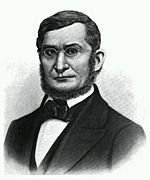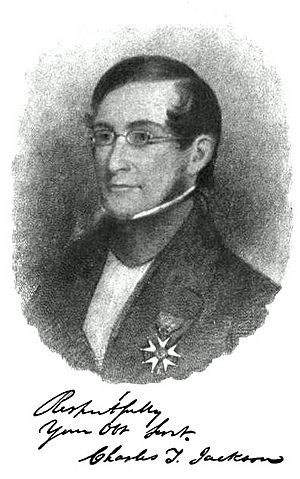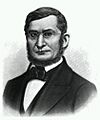Charles Thomas Jackson facts for kids
Quick facts for kids
Charles Thomas Jackson
|
|
|---|---|

Charles Thomas Jackson
|
|
| Born | June 21, 1805 |
| Died | August 28, 1880 (aged 75) |
| Nationality | American |
| Scientific career | |
| Fields | medicine |
Charles Thomas Jackson (born June 21, 1805 – died August 28, 1880) was an American doctor and scientist. He was involved in many fields like medicine, chemistry, and geology.
Contents
Early Life and Education
Charles Thomas Jackson was born in Plymouth, Massachusetts. His family was well-known in New England. He was even the brother-in-law of famous writer Ralph Waldo Emerson.
He studied at the Harvard Medical School and graduated in 1829. He won a special prize for his school paper. While at Harvard, he went on a geology trip to Nova Scotia with his friend Francis Alger. This trip made him very interested in geology.
In 1829, he traveled to Europe. He spent several years there studying medicine and geology. He met many important scientists and doctors from Europe during this time.
Work as a Geologist
When Charles Jackson returned to the United States, he became very active in the new state geological survey movement. This was a time when states were mapping their land to find minerals and resources.
Between 1836 and 1844, he worked as the state geologist for Maine, Rhode Island, and New Hampshire. This meant he explored these states to understand their rocks and land.
Exploring Copper in Michigan
In 1844 and 1845, he worked as a mining expert for the Lake Superior Copper Company. This company was trying to mine copper in Michigan's Keweenaw Peninsula. This area is near Lake Superior.
In 1847, Jackson was chosen to be the United States Geologist for the Lake Superior area. This region was soon to become one of the biggest copper-producing places in the world. However, his leadership of this survey did not go well. He was removed from his job, and his assistants, John Wells Foster and Josiah Dwight Whitney, finished the work.
Scientific Disputes
Charles Jackson is also known for being involved in many arguments over who discovered things first. These arguments were often very strong. Usually, someone would announce a discovery, and then Jackson would say he had discovered it earlier. This would lead to a big disagreement.
Some of his famous disputes included:
- The discovery of guncotton (with Christian Friedrich Schönbein).
- The telegraph (with Samuel F. B. Morse).
- How the stomach digests food (with William Beaumont).
- The use of ether for anesthesia (with William T. G. Morton).
Jackson also claimed in 1849 that he was the first to discover that the unusual copper deposits in Lake Superior could be successfully mined. At that time, most people gave credit to Douglass Houghton, Michigan's first state geologist, who had recently passed away. However, later evidence showed that Jackson's claim was actually correct. His ideas about minerals were ahead of his time.
Later Life
By 1873, Charles Jackson became very ill with a mental illness. He spent the rest of his life in the McLean Asylum in Somerville, Massachusetts. He passed away there on August 28, 1880.
He is buried at Mount Auburn Cemetery in Cambridge, Massachusetts. Interestingly, one of his rivals, Dr. William T. G. Morton, is also buried there.
See also
 In Spanish: Charles Thomas Jackson para niños
In Spanish: Charles Thomas Jackson para niños
Images for kids




